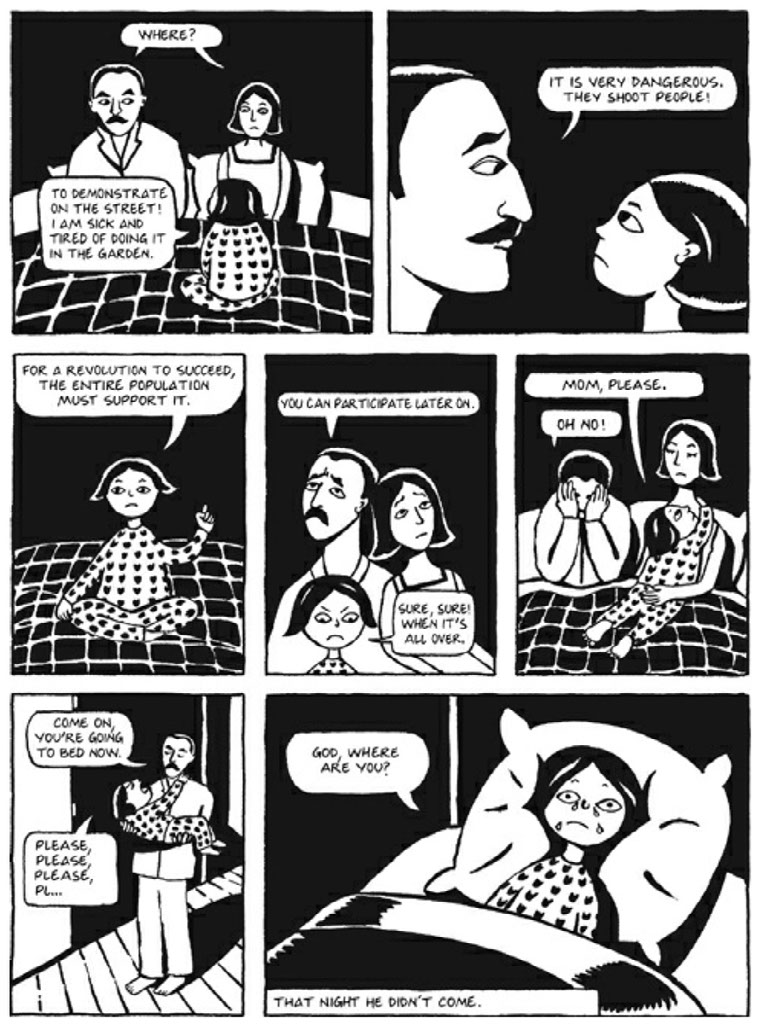Persepolis - Chapter 2: "The Bicycle" Sam and Adam
PLOT
- It was the start of the Islamic State Revolution after the Shah was eventually overthrown

The revolution is like a bicycle. When the wheels don't turn, it falls. p10
- Marji is given books to learn about the history of Iran (invasions and revolutions) and other countries

To enlighten me they bought books. p12
- Marji shows less interest and desire to be a prophet (doesn't believe in God as much), more interested in revolutions and history

The year of the revolution I had to take action, so I put my prophetic destiny aside for a while. p10
- The theatre burnt down with hundreds of people locked inside. The Shah and the police forbade people from trying to leave the burning theatre and those who wanted to rescue them

The police forbade people to rescue those locked inside. P14
- Marji is eager to participate in protests/demonstrations but her parents forbid her to go

I want to come with you tomorrow! p16
THEMES

- Internal conflict within herself between religion and science.
- Different ideas and values

pg.6

pg.13

pg.13
Control through fear
- corrupt government through the Shah
- locked up theatre with many innocent people inside and let it burn
- didn't allow for people to leave nor go rescue

pg.14
pg.14

pg.15

pg.15

pg.17
Freedom through knowledge
- The books given to Marji and the pleasure she gains through reading direct her to seek a life of freedom and science.

pg.12

pg.12

pg.12
What happens to the protagonist 'Marji' and what does she reveal/learn?

pg.16
- Marji during this chapter becomes more absorbed into the political struggles of the situation
- She learns of the corruption that exists within the government and the history of Iran (revolutions and invasions)
- Allows her to gain a broader understanding historically
- Becomes more frustrated with the circumstances of Iran at the time
- Therefore, she feels compelled to take part in demonstrations of revolution and rebel
- Through 'Marji', the reader can understand and learn the context of Iran and the Islamic State Revolution during the 1980s
How does a child's perspective influence the reader's Opinion?

The children performed their own "demonstrations" pg.10

pg.10
- 'Marji' and many other Iranian children don't understand the severity of the state of her country. As a result the things she does and says are a source of humour the story.
- Marji and her friends hold their own demonstration
- Unusual for children to be so involved and interested in politics. It is more appropriate for mature people (adults).
- Through Marji's perspective the danger and fear of war is sensitised by her imagining herself as her favourite rebel, Che Guiveira and Fidel Castro. This is evident in this image here, her and her friends are surrounded by black/darkeness, symbolising fear, danger and the Unknown.
- When Marjane's imagination is mixed with the reality of a real ongoing revolutions, it causes her wanting to take part in the fight for justice
How does humour tone down the serious nature of the issue?

The conversations between Marji and God provide a humorous aspect of the book pg.13
- Satrapi implements conversations between her younger self Marji and 'God'
- Provides the reader with a lighthearted reading experience and arouses interest to the reader
- Satrapi constructs the plot and the frames in a way that it almost seems believable that Marji did have real conversations with God
- They talk about the current political circumstance of Iran and the revolution and Marji's goal to become a prophet
- However they also have conversations about everyday general topics: God says, "Tomorrow the weather is going to be nice"